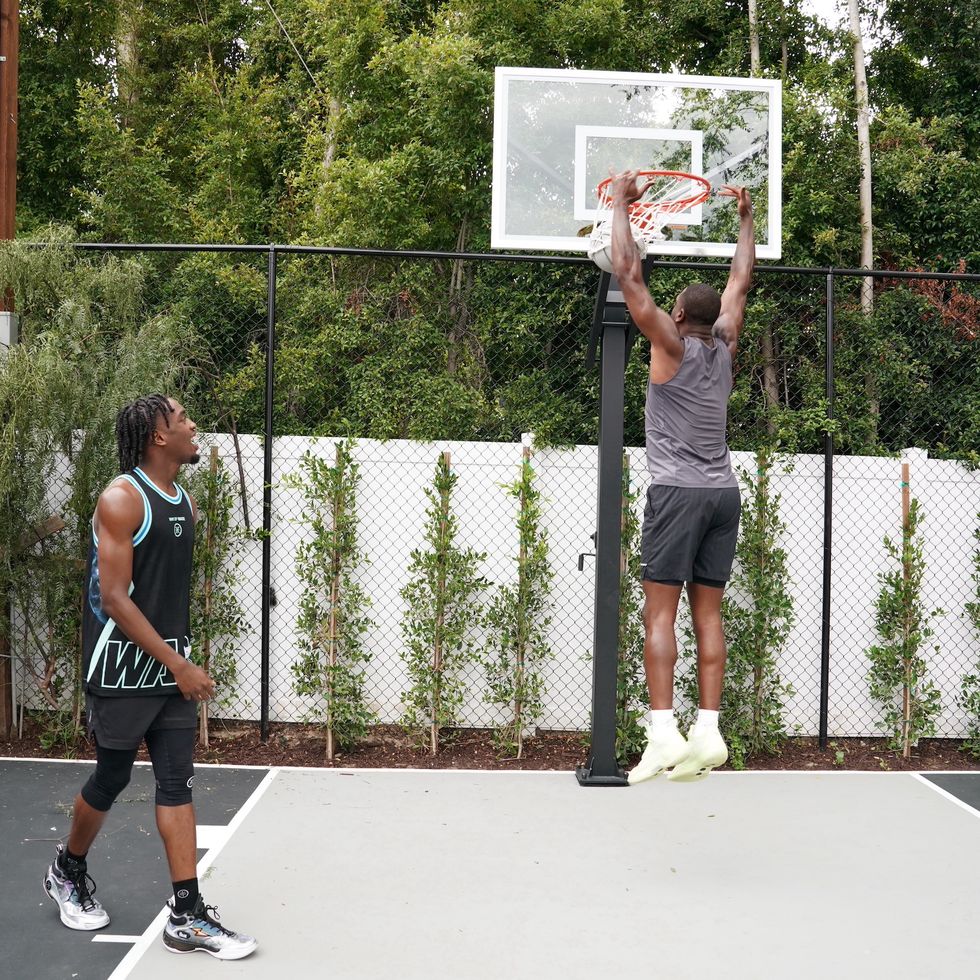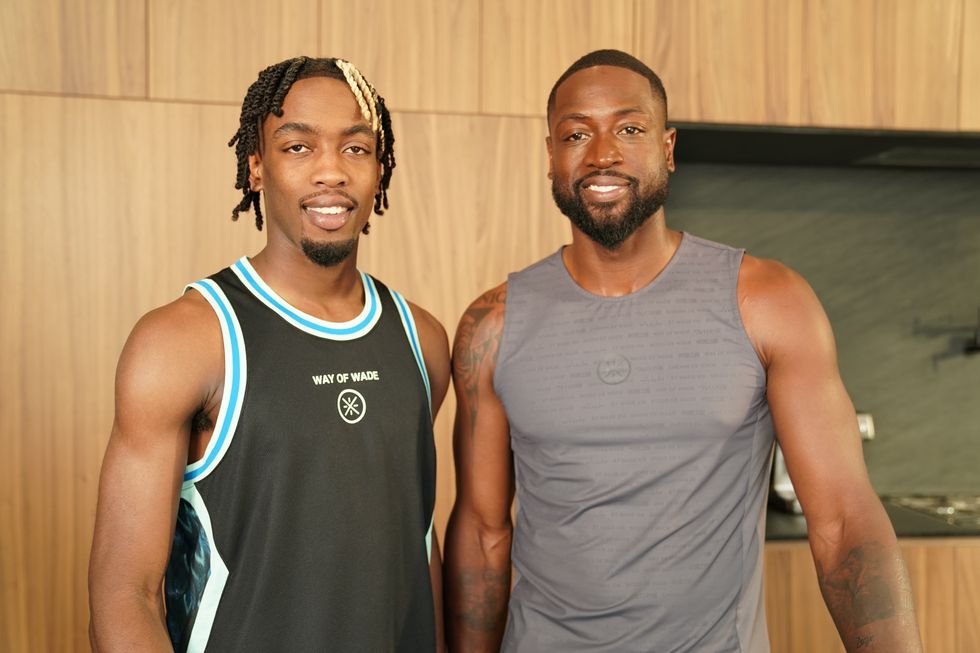IF YOU ASKED Dwyane Wade, future Hall of Famer, 20 years ago about his longevity—in the NBA and in life—he would have pointed you to the professionals. You know, the ones who told him what to eat and how to train and why he never should have left the Heat for those two seasons (I’m kidding on the last one, sorta). Now with his NBA days behind him, Wade, 41, is taking matters into his own hands and doing everything he can to live the healthiest, longest life possible.
One of the ways he’s doing this is by partnering with science-driven wellness company and supplement manufacturer Thorne for the company’s “Build to Last” campaign (before you roll your eyes, he wants you to know this is a partnership, not a sponsorship). Thorne has become a go-to source for Wade’s health and wellness, and the same can be said for his 21-year-old son, Zaire, who’s also joined the campaign. This is the first time the father-son duo have worked together in a business capacity, according to Zaire, but it didn’t take much convincing—Zaire’s been using Thorne’s supplements since his ankle injury a few years ago.
While physical health, a key pillar of the campaign, is important to DWade, he also prioritizes mental health and self-care too. He meditates, gets facials every two weeks (“I got to take care of this face!”), goes to the dentist (this is your sign to book your next appointment), and takes care of himself emotionally and spiritually. “My message to everybody is let’s focus on the inner a lot too,” he says. “If you feel good inside, your outer is going to look a lot better.” Ahead of the campaign’s release, Wade chatted with Men’s Health about taking control of his health and how his approach to longevity has evolved, below.
Men’s Health: A lot of people talk about longevity without really knowing or understanding what it is. What does longevity mean to you?
Dwyane Wade: Oh man. Longevity is a day-to-day process. You can’t skip steps. I’m a routine person already because of my sport. I’m learning the things that I need for me, for my mental health, for my mental awareness. So it looks like solitude every day, it looks like meditation every day, it looks like working out physically at least a few times a week, getting a chance to walk, clear [my] mind. And it looks like recovery. Finding a brand that helps me when it comes to recovery, that is everything to me. We show up for a lot of people all the time, but a lot of people forget to show up for ourselves. The health journey forces you to show up for you.
How has your approach to longevity evolved over the years, especially since retiring from the NBA?
When I was in the league, I really didn’t think about it like that. You think the NBA’s going to last forever. You’re young, you’re just moving in life. And also when it came to my health, I really gave it to the professionals of the team to tell me what I needed. I got asked questions as I got older, I started being that guy, but I really didn’t know a lot about what my body needed and what was wrong with my body or right with my body. It’s just different when you don’t have that army behind you like that. So now I’m like, I got to find all my own information. I need help out here.
I’ve had multiple surgeries. I know what my bones and my joints feel like. I know what kind of energy makes me feel good about the day versus when I don’t have it. Now I’m able to find the best products to help me get there. It’s a lifetime thing now.
What does your current workout/training routine look like?
I’m not throwing weights around [laughs]. Yeah, I’m trying to fit in my clothes. I think the biggest thing, no matter what I’m doing, is the consistency in what I’m doing. When I’m home, no matter when my feet touch the ground at 4:00 a.m., 5:00 a.m., 6:00 a.m., I get up and work out. A lot of it’s for my mental and lot of it’s for my physical. I want to look a certain way and I also want to feel a certain way. So I understand the importance of that. But it’s different [from my NBA days]. I do a lot of steam room, a lot of sauna, a lot of cold tub.
I do all these things to help me not only with weight loss, but the mental aspect of it. I understand that I’m taking care of my body from the way I’m training, but am I taking care of the inside of my body and am I training that right? Also, am I making sure that when I get done putting in an hour in the gym and going to the sauna and going to the steam room, do I got my creatine? Do I got my recovery? Do I got the things I need to make sure that I can do this again the next day or that my body can perform throughout the day? These are the things that I’m starting to learn. Because I’m new to it, I’ve jumped into it and I want to help other people who are new to it as we learn about our health.
Do you still have a trainer or do you do everything pretty much by yourself now?
I do everything pretty much by myself. My wife calls in a trainer sometimes when she has to get ready for a certain movie or a certain shoot, and then sometimes I’ll step in. But I do this myself. It’s kind of cool because I got to go find my own information, I got to go out and search and see what different exercises I need. When I bring in a professional, I learn from them, but just normally it’s not a daily thing for me. When I travel, I don’t train, but I’m damn sure going to get out and get some fresh air. I’m going to walk, put something in to keep my heart rate up, to keep my body going, to keep my mind fresh.
What’s your approach to managing your mental health?
It changes at different times depending on what [I] need. I have an app called Insight Timer, where I listen to different meditations on the daily. There are certain podcasts that I listen to that allows me to mentally get what I need. [I often think] mentally, what do I need? How do I strengthen this muscle? This is the most important muscle to strengthen, while I’m strengthening my body. It’s become very important in my life, to say the least, just understanding the importance of mental health. Having a lot of people come out and speak on their mental health has helped all of us understand that it’s really important.
It’s cool because you see guys in the league like Kevin Love talking openly about mental health. Did it feel more taboo when you were in the league?
Yeah. That’s how things go once one person speaks out. Kevin Love was one of the guys that led the charge on speaking out on mental health and wellness. Then guys felt more comfortable. Whenever someone is vulnerable enough, especially when a man sits in front of a camera and is vulnerable, it makes other guys realize, oh, I can be vulnerable too. I don’t have to keep up this armor that I’m the toughest person in the room all the time. It’s important that people share those stories. As much as you don’t want to because of the vulnerability of them, that’s how other people learn, that’s how other people don’t make the same mistakes, or whatever the case may be. I definitely give those guys a lot of credit.
Looking back, do you feel like you did everything you could to extend your longevity in the NBA?
I did everything I could with the information that I had. I got a chance to play with guys like Ray Allen, LeBron James—guys who really take care of their bodies in ways that is just not normal for an athlete. That’s been the cool thing. I’m a student and I watch what other people do. I also watch what my wife does, and it allows me to be like, okay, that’s working, I see that, then let me go and put that into my life. Why not follow the blueprint?
What would you say to readers who are looking to become more informed about their health, but aren’t sure where to start?
[Talk to] your physician, your parents. Ask questions. I don’t know why conversations about our health are uncomfortable for people to have. If you care about living, if you care about living healthy, you should want to know as much information as possible. We don’t even ask our parents enough, our parents don’t share enough. These are people who have the same DNA as us. Make sure that you get informed, and find the people close to you who are dealing with some of the similar things or the people that you trust to inform you. It’s okay that you don’t know. This whole notion that we got to know everything, that’s false because I know we don’t. That’s where my focus is.
So your PSA is go to the doctor and talk to your family.
Yeah. I’m thankful to have a dad who’s 66 and has dealt with some health issues because it allows him to educate me on health issues. So I know to go to the doctor and say, “Hey, my dad is dealing with this. Can you check this?” It just sounds like health 101, but we don’t do this enough—especially in our community. So yes, do it.
Shop some of the products from DWade’s Thorne collection here.
Deputy Editor
Rachel Epstein is the Deputy Editor at Men’s Health, where she oversees, edits, and assigns content across MensHealth.com. She previously held roles at Marie Claire and Coveteur. Offline, she’s likely watching a Heat game or finding a new coffee shop.




Comments are closed.